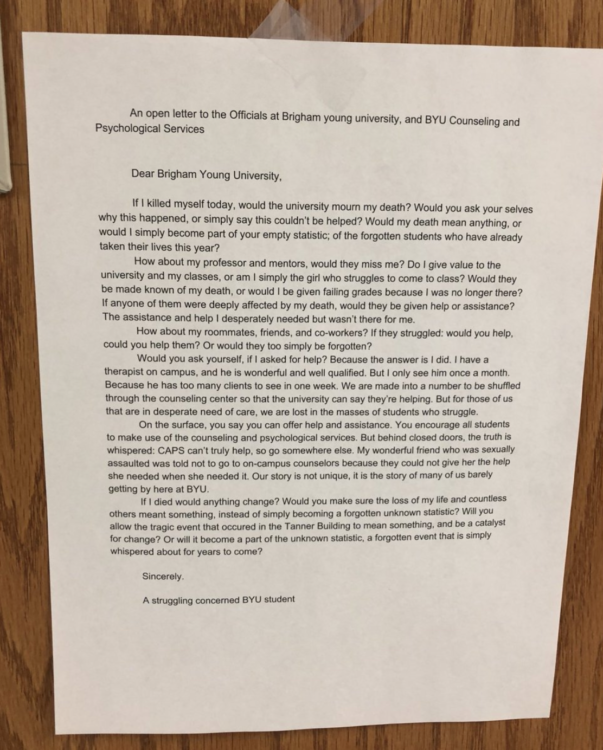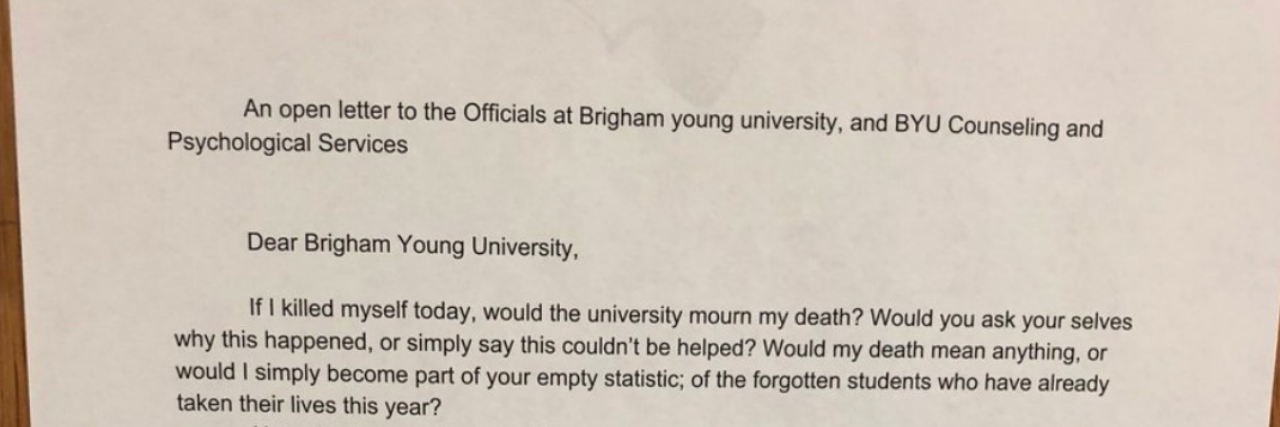Anonymous BYU Student Pens Letter on Lack of Mental Health Resources on Campus
Editor's Note
If you experience suicidal thoughts, the following post could be potentially triggering. You can contact the Crisis Text Line by texting “START” to 741741.
A student at Brigham Young University (BYU) in Provo, Utah, attempted suicide in a public place on campus Monday. She was critically injured and died Wednesday. Following the news, students are using the tragedy to call out the lack of effective mental health resources on their campus.
By Monday night, an open letter to officials at the university as well as at the Counseling and Psychological Services (CAPS) was taped to the doors of the CAPS and the Title IX offices. A photo of the letter was then shared on Twitter by another student who came across it. The letter was from a “struggling concerned BYU student,” who said, despite seeking resources and therapy at the counseling offices, she was not receiving the help she needed.
It wasn’t because her therapist wasn’t working out, she noted, but because she was only able to see him once a month because he had too many clients to see her more frequently.
Often after someone dies by suicide, people post on social media encouraging others to seek help if they’re struggling. As the anonymous student pointed out, she has sought help, but it hasn’t been enough.
Unfortunately, the situation at BYU is not unique. Many college campuses are overburdened by demand for mental health help, just like the general mental health system. According to survey data, about 1 in 3 college freshman struggle with mental health issues, but not all of these students seek help.
There aren’t enough mental health clinicians to keep up with the number of students who do seek help, though. A federal study found students across the U.S. face long wait times for on-campus counseling services. Some universities employ session “caps,” meaning students can only access the therapy services for a certain amount of sessions.
“We are made into a number to be shuffled through the counseling center so that the university can say they’re helping,” the anonymous BYU student wrote. “But for those of us that are in desperate need of care, we are lost in the masses of students who struggle.”
The student continued:
On the surface, you say you can offer help and assistance. You encourage all students to make use of the counseling and psychological services. But behind closed doors, the truth is whispered: CAPS can’t truly help so go somewhere else.
The student hypothetically said that if she died by suicide, would the university ask “why this happened, or simply say this couldn’t be helped?” She wondered if her death would just become a part of the “empty statistic” of student deaths and the “forgotten students who have already taken their lives this year.”
According to the American Psychiatric Association, 50 percent of people with a mental illness have symptoms starting before the age of 14. By the age of 24, 75 percent of people with mental illness begin experiencing symptoms.
The average age of college students ranges from 18 to 24, which means students are at a prime age for developing or exhibiting symptoms of mental illness. According to government data, over 12 million college students are under the age of 25, and suicide is the second-leading cause of death for people ages 15 to 24.
In response to the situation, CAPS said in a statement it shares the “frustration and worry of students who are concerned about the wait time for individual, non-crisis appointments.” The university said it has tried to meet demands by hiring two counselors (for a total of 29) over the last four years and funding three part-time therapists. CAPS said the university is pursuing a proposal to add more therapists as well. Total enrollment at BYU is over 33,000.
The increase in awareness and advocacy for mental health has allowed many people to feel comfortable or able to seek help. The mental health system has to catch up to meet the demand by hiring more therapists (and more people pursuing a career in counseling) as well as increasing accessibility for people who seek treatment.
You can find the full letter below:

Full text (sic):
An open letter to the Officials at Brigham Young University, and BYU Counseling and Psychological Services
Dear Brigham Young University,
If I killed myself today, would the university mourn my death? Would you ask your selves why this happened, or simply say this couldn’t be helped? Would my death mean anything, or would I simply become part of your empty statistic; of the forgotten students who have already taken their lives this year?
How about my professor and mentors, would they miss me? Do I give value to the university and my classes, or am I simply the girl who struggles to come to class? Would they be made known of my death, or would I be given failing grades because I was no longer there? If anyone of them were deeply affected by my death, would they be given help or assistance? The assistance and help I desperately needed but wasn’t there for me.
How about my roommates, friends, and co-workers? If they struggled; would you help, could you help them? Or would they too simply be forgotten?
Would you ask yourself, if I asked for help? Because the answer is I did. I have a therapist on campus, and he is wonderful and well qualified. But I only see him once a month. Because he has too many clients to see in one week. We are made into a number to be shuffled through the counseling center so that the university can say they’re helping. But for those of us that are in desperate need of care, we are lost in the masses of students who struggle.
On the surface, you say you can offer help and assistance. You encourage all students to make use of the counseling and psychological services. But behind closed doors, the truth is whispered: CAPS can’t truly help, so go somewhere else. My wonderful friend who was sexually assaulted was told not to go to on-campus counselors because they could not give her the help she needed when she needed it. Our story is not unique, it is the story of many of us barely getting by hereat BYU.
If I died would anything change? Would you make sure the loss of my life and countless others meant something, instead of simply becoming a forgotten unknown statistic? Will you allow the tragic even that occured in the Tanner Building to mean something, and be a catalyst for change? Or will it become a part of the unknown statistic, a forgotten event that is simply whispered about for years to come?
Sincerely,
A struggling concerned BYU student
Photo via Twitter

